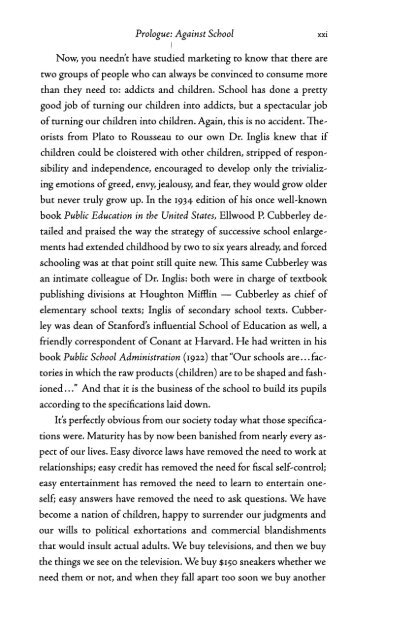john-taylor-gatto-weapons-of-mass-instruction
john-taylor-gatto-weapons-of-mass-instruction
john-taylor-gatto-weapons-of-mass-instruction
You also want an ePaper? Increase the reach of your titles
YUMPU automatically turns print PDFs into web optimized ePapers that Google loves.
Prologue: Against School<br />
XXI<br />
I<br />
Now, you needn't have studied marketing to know that there are<br />
two groups <strong>of</strong> people who can always be convinced to consume more<br />
than they need to: addicts and children. School has done a pretty<br />
good job <strong>of</strong> turning our children into addicts, but a spectacular job<br />
<strong>of</strong> turning our children into children. Again, this is no accident. Theorists<br />
from Plato to Rousseau to our own Dr. Inglis knew that if<br />
children could be cloistered with other children, stripped <strong>of</strong> responsibility<br />
and independence, encouraged to develop only the trivializing<br />
emotions <strong>of</strong> greed, envy, jealousy, and fear, they would grow older<br />
but never truly grow up. In the 1934 edition <strong>of</strong> his once well-known<br />
book Public Education in the United States, Ellwood P. Cubberley detailed<br />
and praised the way the strategy <strong>of</strong> successive school enlargements<br />
had extended childhood by two to six years already, and forced<br />
schooling was at that point still quite new. This same Cubberley was<br />
an intimate colleague <strong>of</strong> Dr. Inglis: both were in charge <strong>of</strong> textbook<br />
publishing divisions at Houghton Mifflin -<br />
Cubberley as chief <strong>of</strong><br />
elementary school texts; Inglis <strong>of</strong> secondary school texts. Cubberley<br />
was dean <strong>of</strong> Stanford's influential School <strong>of</strong> Education as well, a<br />
friendly correspondent <strong>of</strong> Conant at Harvard. He had written in his<br />
book Public School Administration (1922) that "Our schools are ... factories<br />
in which the raw products (children) are to be shaped and fashioned<br />
... " And that it is the business <strong>of</strong> the school to build its pupils<br />
according to the specifications laid down.<br />
It's perfectly obvious from our society today what those specifications<br />
were. Maturity has by now been banished from nearly every aspect<br />
<strong>of</strong> our lives. Easy divorce laws have removed the need to work at<br />
relationships; easy credit has removed the need for fiscal self-control;<br />
easy entertainment has removed the need to learn to entertain oneself;<br />
easy answers have removed the need to ask questions. We have<br />
become a nation <strong>of</strong> children, happy to surrender our judgments and<br />
our wills to political exhortations and commercial blandishments<br />
that would insult actual adults. We buy televisions, and then we buy<br />
the things we see on the television. We buy $150 sneakers whether we<br />
need them or not, and when they fall apart too soon we buy another


